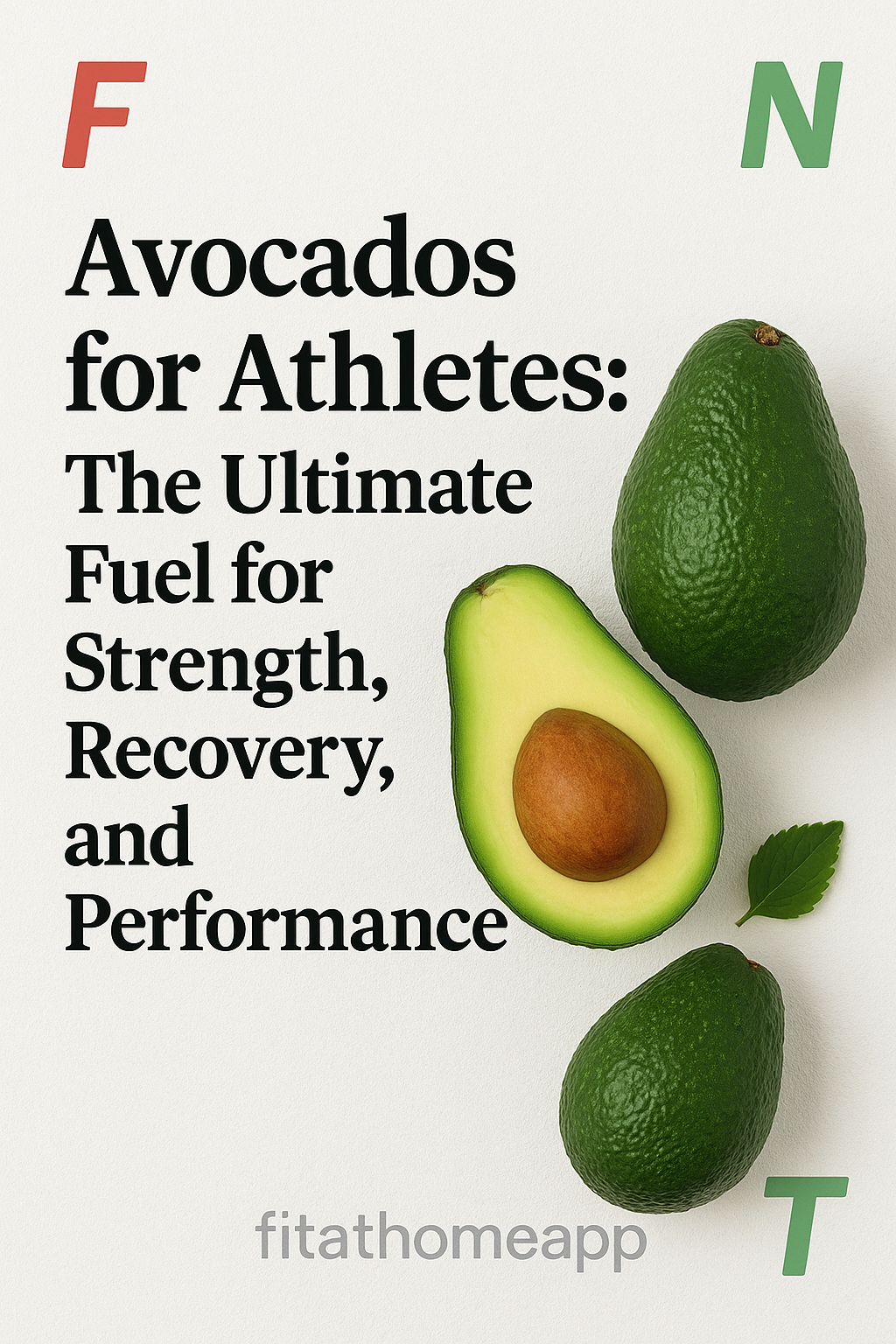Introduction: Nature’s Secret Weapon for Athletic Performance
In the ever-evolving world of sports nutrition, athletes and fitness enthusiasts are always looking for foods that provide a competitive edge—whether it’s through enhanced energy, improved recovery, or better overall health. Among the many so-called “superfoods,” one stands out for its unique combination of nutrients, healthy fats, and performance-boosting benefits: the avocado.
Once considered just a trendy food item, the avocado is now recognized as a legitimate performance enhancer. From its rich content of heart-healthy monounsaturated fats to its impressive vitamin and mineral profile, this creamy fruit is fast becoming a go-to for serious athletes who want to fuel smart, recover faster, and perform better.
?A Nutritional Powerhouse: What’s Inside an Avocado
Avocados are packed with essential nutrients that athletes rely on for peak performance:
Monounsaturated fats: These fats help support steady energy levels, promote heart health, and aid in the absorption of fat-soluble vitamins (A, D, E, and K).
Potassium: More than a banana, avocados deliver over 700 mg per serving—critical for fluid balance, muscle contractions, and preventing cramps.
Magnesium: Aids in muscle relaxation, nerve function, and energy production.
Fiber: Supports digestion and helps regulate blood sugar, which is essential for steady energy during workouts.
B vitamins: Including B6 and folate, which contribute to energy metabolism and red blood cell production.
This combination makes avocados more than just a tasty addition to meals—it makes them an integral part of any performance-focused diet.
Fuel for Strength and Endurance
Athletes need fuel that sustains—not spikes and crashes. Avocados are ideal in this regard. The healthy fats they contain digest slowly, providing lasting energy for endurance athletes like runners, cyclists, and swimmers.
For strength athletes, the monounsaturated fats found in avocados are also key for hormonal support, particularly testosterone production. This hormone plays a major role in muscle growth, strength, and recovery. Consuming sufficient healthy fats ensures your body has the resources it needs to build and maintain muscle mass.
Avocados are also calorie-dense, making them ideal for athletes in bulking phases or those training multiple times per day. Just half an avocado can contribute significantly to daily energy needs without weighing you down.
Post-Workout Recovery: Avocados and Inflammation
Recovery is just as important as the workout itself—and this is where avocados truly shine.
Strenuous exercise causes micro-tears in muscle tissue, leading to inflammation and soreness. Avocados contain anti-inflammatory compounds, including omega-3 and omega-6 fatty acids, vitamin E, and phytochemicals like carotenoids and polyphenols. These nutrients help reduce inflammation, speed up muscle repair, and lower recovery time between sessions.
Additionally, the potassium and magnesium in avocados help replenish electrolytes lost through sweat, reducing the risk of cramps, fatigue, and delayed-onset muscle soreness (DOMS). For athletes who train daily, faster recovery means more consistent performance and reduced injury risk.
Improving Nutrient Absorption and Gut Health
Another advantage of eating avocados is their ability to enhance nutrient absorption. Fat-soluble vitamins—such as A, D, E, and K—require dietary fats to be absorbed properly. Including avocados in meals ensures your body actually uses the nutrients from other foods, such as leafy greens, lean proteins, and complex carbs.
Avocados also support gut health through their fiber content, promoting regular digestion and a healthy microbiome. A healthy digestive system translates into better nutrient uptake, improved immune response, and less bloating or discomfort during training.
How to Add Avocados to Your Athlete Meal Plan
One of the best things about avocados is how versatile they are. You don’t need to eat them plain—there are countless ways to enjoy them as part of your daily meals:
Avocado toast: Add eggs, tomatoes, or seeds for a balanced pre-workout breakfast.
Smoothies: Blend half an avocado with banana, spinach, and protein powder for a creamy, energizing shake.
Salads: Dice and toss with leafy greens, quinoa, and grilled chicken or tofu.
Recovery bowls: Combine with black beans, sweet potatoes, and olive oil for a nutrient-rich post-workout meal.
Sandwich spreads: Replace mayonnaise with mashed avocado for a healthier, tastier option.
Baking substitute: Use avocado as a healthy fat substitute in muffins, brownies, or pancakes for a nutrient boost.
Backed by Research: What the Science Says
Several studies have highlighted the performance-enhancing effects of healthy fats, particularly those found in avocados. A review in the Journal of the International Society of Sports Nutrition emphasized the role of monounsaturated fats in reducing exercise-induced inflammation and supporting recovery.
Other studies have linked diets rich in avocados to better cardiovascular function, improved cholesterol levels, and greater nutrient absorption—all vital components of peak athletic performance.
While avocados alone won’t make you an elite athlete, they can play a significant role in supporting your training, fueling your body, and enhancing your health.
Conclusion: Why Avocados Deserve a Place in Every Athlete’s Diet
Whether you’re training for a marathon, building muscle, or simply trying to stay in peak condition, avocados offer a natural, effective way to nourish your body. With their rich supply of healthy fats, electrolytes, antioxidants, and fiber, they support energy production, aid in recovery, and promote long-term health.
Avocados are not just a trendy health food—they are a scientifically backed, performance-enhancing powerhouse that belongs in every serious athlete’s kitchen.
Fuel your body the right way. Add an avocado to your day—and feel the difference in your performance
Personal Take on the Video
This video, “HIIT Hill Sprints & Avocado Smoothie Recipe | Everyday Beast”, balances intense training with smart recovery. It showcases how nutrient-rich avocado smoothies pair seamlessly with high-intensity workouts, delivering the healthy fats, potassium
Nutrient-Rich Fuel
Avocados deliver monounsaturated fats, potassium, B vitamins, fiber, and more—essential for energy, muscle function, and recovery.
Performance and Recovery Benefits
According to the World Avocado Organisation, these nutrients enhance blood flow, help reduce inflammation, and support metabolic recovery—key priorities for athletes.
Digestive and Absorption Support
Healthy fats in avocados aid in absorbing fat-soluble vitamins from other foods, while fiber supports a healthy gut—critical for overall nutrient balance and athletic performance.
Practical Athlete-Ready Recommendations
Sports nutrition guidelines suggest incorporating avocados into both pre-workout meals and post-exercise recovery bowls or shakes for sustained energy and improved muscle repair.
Avocado and Cherries: A Nutrient-Packed Duo for Athletes
When it comes to optimal nutrition for athletes, few combinations are as surprisingly powerful as avocado and cherries. While they may seem like an unusual pairing at first glance—avocados being rich and creamy, cherries being sweet and tart—they actually complement each other in both nutritional value and functional health benefits, especially for those seeking enhanced recovery, endurance, and performance. Both are fruits that pack a serious nutritional punch, and together, they can offer athletes a holistic approach to fueling the body and speeding up recovery.
Avocados are well known for their heart-healthy monounsaturated fats, particularly oleic acid, which helps reduce inflammation and supports joint and cardiovascular health. For athletes, this is essential—not just for recovery after training, but also for maintaining long-term performance. Avocados are also rich in potassium, even more so than bananas, which helps regulate muscle contractions and fluid balance—key elements in avoiding cramps and fatigue. Additionally, avocados are a good source of vitamin E, a powerful antioxidant that protects cells from oxidative stress caused by intense physical activity.
On the other side, cherries—especially tart cherries—are loaded with anthocyanins, which are natural compounds known to reduce inflammation and muscle soreness. Multiple studies have shown that athletes who consume tart cherry juice or whole cherries before and after workouts experience less muscle damage and faster recovery. Cherries also contain melatonin, which supports better sleep quality—an often-overlooked aspect of physical recovery and performance optimization.
But what makes this pairing particularly unique is how these two fruits balance each other nutritionally. Cherries are low in fat and provide quick-digesting carbohydrates, perfect for immediate post-workout glycogen replenishment. Avocados, on the other hand, provide healthy fats that sustain energy levels over time, along with fat-soluble vitamins like K, E, and B6. Together, they create a well-rounded recovery meal or snack—supporting both short-term recovery and long-term physical health.
Athletes can easily incorporate both fruits into their diet in creative and delicious ways. For example, a post-workout smoothie made with frozen cherries, avocado, almond milk, and a scoop of protein powder offers anti-inflammatory benefits, healthy fats, and muscle-repairing amino acids—all in one drink. Alternatively, a salad with leafy greens, sliced avocado, dried tart cherries, and quinoa makes a balanced recovery lunch that is high in antioxidants, fiber, and energy-boosting nutrients.
What also links avocados and cherries is their shared classification as fruits with a single large seed—commonly referred to as stone fruits. While avocados are often mistaken for vegetables, they are botanically a large berry with a single seed, similar in classification to cherries. This botanical link only strengthens the case for combining them—not just for flavor, but for how they support human health and performance.
In conclusion, the partnership between avocado and cherries is more than just a nutritional coincidence. It’s a smart, science-backed choice for athletes who want to recover faster, reduce inflammation, and fuel their bodies naturally. Whether in smoothies, salads, or snacks, this powerful fruit duo delivers the nutrients active bodies need to perform at their best.

